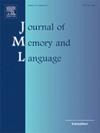用身体理解?测试动词相对体现在语言和记忆界面任务中的作用
IF 3
1区 心理学
Q1 LINGUISTICS
引用次数: 0
摘要
概念知识的多重表征说认为,除了纯粹的语言信息外,与感觉-运动经验相关的信息也有助于文字处理。然而,很多问题仍未得到充分研究,包括这些维度对动词(而非名词)处理的影响程度,尤其是在英语以外的语言中,以及它们在语言-记忆连续体的不同任务中的作用。在此,我们收集了 647 个意大利动词与身体体验相关的动词特异性维度(相对体现,RE)的评分,并在三个不同的调节语义激活和记忆过程的任务(即词汇判断、语法判断和记忆识别)中测试了其影响。我们的研究结果表明,RE 在词汇判断和记忆识别中具有可靠的影响,但在语法判断中却没有影响,这可能是由于意大利语形态丰富的缘故。跨任务分析显示,与词汇决策相比,RE 在记忆识别中的影响要大得多,这表明语义和情节过程在语言和记忆的界面上相互作用。总之,研究结果表明,在动词加工过程中,感觉-运动和身体相关经验发挥着灵活且与语境相关的作用,同时也指出了语言特有的因素和对陈述性记忆组织的影响。本文章由计算机程序翻译,如有差异,请以英文原文为准。
Understanding with the body? Testing the role of verb relative embodiment across tasks at the interface of language and memory
Multiple representation accounts of conceptual knowledge argue that information associated with sensory-motor experience, in addition to pure linguistic information, contributes to word processing. A number of issues, however, remain under-investigated, including the extent to which these dimensions affect verb processing (rather than nouns), especially in languages other than English, and their role across different tasks along the language-memory continuum. Here, we collected ratings for a verb-specific dimension linked to bodily experience (relative embodiment, RE) for 647 Italian verbs and we tested its effects in three tasks differently modulating semantic activation and memory processes (i.e., lexical decision, grammatical decision, and memory recognition). Our results showed reliable influences of RE during lexical decision and memory recognition, but not in grammatical decision, possibly due to the Italian morphological richness. The cross-task analysis showed that RE effects were substantially higher in memory recognition compared to lexical decision, indicating that semantic and episodic processes interact at the interface of language and memory. Overall, results support the flexible and context-dependent role of sensory-motor and bodily-related experience during verb processing, pointing also to language-specific factors and implications for the organization of declarative memory.
求助全文
通过发布文献求助,成功后即可免费获取论文全文。
去求助
来源期刊
CiteScore
8.70
自引率
14.00%
发文量
49
审稿时长
12.7 weeks
期刊介绍:
Articles in the Journal of Memory and Language contribute to the formulation of scientific issues and theories in the areas of memory, language comprehension and production, and cognitive processes. Special emphasis is given to research articles that provide new theoretical insights based on a carefully laid empirical foundation. The journal generally favors articles that provide multiple experiments. In addition, significant theoretical papers without new experimental findings may be published.
The Journal of Memory and Language is a valuable tool for cognitive scientists, including psychologists, linguists, and others interested in memory and learning, language, reading, and speech.
Research Areas include:
• Topics that illuminate aspects of memory or language processing
• Linguistics
• Neuropsychology.

 求助内容:
求助内容: 应助结果提醒方式:
应助结果提醒方式:


